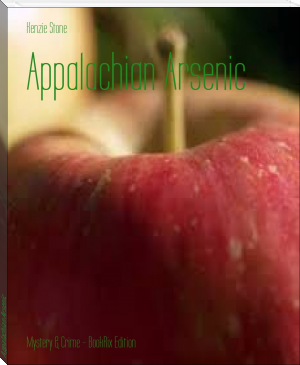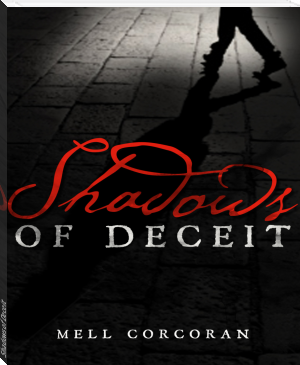A Life for a Life, Lynda McDaniel [best books to read for students txt] 📗

- Author: Lynda McDaniel
- Performer: -
Book online «A Life for a Life, Lynda McDaniel [best books to read for students txt] 📗». Author Lynda McDaniel
As Jake and I wound our way, the bright green tree buds and wildflowers soothed my dark thoughts. I breathed in that intoxicating smell of spring: not one thing in particular, but a mix of fragrances floating on soft breezes, signaling winter’s retreat. The birds were louder too, chittering and chattering in the warmer temperatures. I was lost in my reverie when Jake stopped so fast I almost tripped over him. He stood still, ears alert.
“What is it, boy?” He looked up at me, then resumed his exploration of rotten squirrels and decaying stumps.
I didn’t just love that dog, I admired him. He was unafraid of his surroundings, plowing through tall fields of hay or dense forests without any idea where he was headed, not the least bit perturbed by bugs flying into his eyes or seeds up his nose. He’d just sneeze and keep going.
We walked a while longer and came to a favorite lunch spot. I nestled against a broad beech tree, its smooth bark gentler against my back than the alligator bark of red oak or locust. Jake fixated on a line of ants carrying off remnants from a picnic earlier that day, rooting under leaves and exploring new smells since his last visit. But mostly he slept. He found a sunspot and made a nest thick with leaves, turning round and round until everything was just right.
Jake came to live with me a year and a half ago when a neighbor committed suicide, a few months before I moved south. We both struggled at first, but when we settled here, the past for him seemed forgotten. Sure, he still ran in circles when I brushed against his old leash hanging in the coat closet, but otherwise, he was officially a mountain dog. I was the one still working on leaving the past behind.
I’d bought the store on a whim after a week’s stay in a log cabin in the Black Mountains. To prolong the trip, I took backroads home. As I drove through Laurel Falls, I spotted the boarded-up store sporting a For Sale sign. I stopped, jotted down the listed phone number, and called. Within a week, I owned it. The store was in shambles, both physically and financially, but something about its bones had appealed to me. And I could afford the extensive remodeling it needed because the asking price was so low.
Back in my D.C. condo, I realized how much I wanted a change in my life. I had no family to miss. I was an only child, and my parents had died in an alcoholic daze, their car wrapped around a tree, not long after I left for college. And all those editors and deadlines, big city hassles, and a failed marriage? I was eager to trade them in for a tiny town and a dilapidated store called Coburn’s General Store. (Nobody knew who Coburn was—that was just what it had always been called, though most of the time it was simply Coburn’s. Even if I’d renamed it, no one would’ve used that name.)
In addition to the store, the deal included an apartment upstairs that, during its ninety-year history, had likely housed more critters than humans. Plus a vintage 1950 Chevy pickup truck with wraparound rear windows that still ran just fine. And a bonus I didn’t know about when I signed the papers: a living, breathing griffon to guard me and the store—Abit Bradshaw, Mildred’s teenage son.
I’d lived there almost a year, and I treasured my days away from the store, especially once it was spring again. Some folks complained that I wasn’t open Sundays (blue laws a distant memory, even though they were repealed only a few years earlier), but I couldn’t work every day, and I couldn’t afford to hire help, except now and again.
While Jake and I sat under that tree, the sun broke through the canopy and warmed my face and shoulders. I watched Jake’s muzzle twitch (he was already lost in a dream), and chuckled when he sprang to life at the first crinkle of wax paper. I shooed him away as I unwrapped my lunch. On his way back to his nest, he stopped and stared down the dell, his back hairs spiking into a Mohawk.
“Get over it, boy. I don’t need you scaring me as bad as Mildred. Settle down now,” I gently scolded as I laid out a chunk of Gruyere I’d whittled the hard edges off, an almost-out-of-date salami, and a sourdough roll I’d rescued from the store. I’d been called a food snob, but these sad leftovers from a struggling store sure couldn’t support that claim. Besides, out here the food didn’t matter so much. It was all about the pileated woodpecker trumpeting its jungle call or the tiny golden-crowned kinglet flitting from branch to branch. And the waterfall in the distance, playing its soothing continuo, day and night. These walks kept me sane. The giant trees reminded me I was just a player in a much bigger game, a willing refugee from a crowded, over-planned life.
I crumpled the lunch wrappings, threw Jake a piece of roll, and found a sunnier spot. I hadn’t closed my eyes for a minute when Jake gave another low growl. He was sitting upright, nose twitching, looking at me for advice. “Sorry, pal. You started it. I don’t hear anything,” I told him. He gave another face-saving low growl and put his head back down.
“You crazy old hound.” I patted his warm, golden fur. Early on, I wondered what kind of mix he was—maybe some retriever and beagle, bringing his size down to medium. I’d asked the vet to hazard a guess. He wouldn’t. Or couldn’t. It didn’t matter.
I poured myself a cup of hot coffee, white with steamed milk, appreciating the magic of a thermos, even if the contents always tasted vaguely of vegetable soup. That aroma took me back to the woods of my childhood, just two vacant lots really, a few blocks from my home in D.C.’s Cleveland Park. I played there for hours, stocked with sandwiches and a thermos of hot chocolate. I guess that’s where I first thought of becoming a reporter; I sat in the cold and wrote up everything that passed by—from birds and salamanders to postmen taking a shortcut and high schoolers sneaking out for a smoke.
A deeper growl from Jake pulled me back. As I turned to share his view, I saw a man running toward us. “Dammit, Mildred,” I swore, as though the intruder were her fault. The man looked angry, pushing branches out of his way as he charged toward us. Jake barked furiously as I grabbed his collar and held tight. Even though the scene was unfolding just as my neighbor had warned, I wasn’t afraid. Maybe it was the Madras sport shirt, so out of place on a man with a bushy beard and long ponytail. For God’s sake, I thought, how could anyone set out in the morning dressed like that and plan to do harm? A hint of a tattoo—a Celtic cross?—peeked below his shirt sleeve, adding to his unlikely appearance.
As he neared, I could see his face wasn’t so much angry as pained, drained of color.
“There’s some ... one,” his voice cracked. He put his hands on his thighs and tried to catch his breath. As he did, his graying ponytail fell across his chest.
“What? Who?”
“A body. Somebody over there,” he said, pointing toward the creek. “Not far, it’s ...” he stopped again to breathe.
“Where?”
“I don’t know. Cross ... creek.” He started to run.
“Wait! Don’t go!” I shouted, but all I could see was the back of his stupid shirt as he ran. “Hey! At least call for help. There’s an emergency call box down that road, at the car park. Call Gregg O’Donnell at the Forest Service. I’ll go see if there’s anything I can do.”
He shouted, “There’s nothing you can do,” and kept running.
Jake led the way as we crashed through the forest, branches whipping our faces. I felt the creek’s icy chill, in defiance of the day’s warmth, as I missed the smaller stepping stones and soaked my feet. Why didn’t I ask the stranger more details, or have him show me where to find the person? And what did “across the creek” mean in an eleven-thousand-acre wilderness area? When I stopped to get my bearings, I began to shiver, my feet numb. Jake stopped with me, sensing the seriousness of our romp in the woods; he even ignored a squirrel.
We were a pack of two, running together, the forest silent except for our heavy breathing and the rustle we made crossing the decaying carpet beneath our feet. Jake barked at something, startling me, but it was just the crack of a branch I’d broken to clear the way. We were both spooked.
I stopped to rest on a fallen tree as Jake ran ahead, then back and to the right. Confused, he stopped and looked at me. “I don’t know which way either, boy.” We were just responding to a deep, instinctual urge to help. “You go on, Jake. You’ll find it before I will.”
And he did.


 Chapter 2: Abit
Chapter 2: Abit

Four cop cars blocked our driveway.
I thought I might’ve dreamed it, since I’d fallen asleep on the couch, watching TV. But after I rubbed my eyes, all four cars was still there. Seeing four black-and-whites in a town with only one could throw you.
All I could think was what did I do wrong? I ran through my day real quick-like, and I couldn’t come up with anything that would get me more than a backhand from Daddy.
I watched a cop walking in front of the store next door, which we shared a driveway with. As long as I could remember, that store hadn’t never had four cars out front at the same time, let alone four cop cars. I stepped outside, quietly closing our front door. The sun was getting low, and I hoped Mama wudn’t about to call me in to supper.
I headed down our stone steps to see for myself. Our house sat on a hill above the store, which made it close enough that Daddy, when he still owned the store, could run down the steps (twenty of ‘em, mossy and slick after a rain) if, say, a customer drove up while he was home having his midday dinner. But of an evening, those same steps seemed to keep people from pestering him to open up, as Daddy put it, “to sell some fool thing they could live without ‘til the next morning.”
I was just about halfway down when the cop looked my way. “Don’t trouble yourself over this, Abit. Nothing to see here.” That was Lonnie Parker, the county’s deputy sheriff.
“What do you mean nothin’ to see here? I ain’t seen four





Comments (0)